Did you know that over 10% of cats exhibit subtle signs of illness before their owners even notice? While cats might seem like independent, stoic creatures, missing the early symptoms of a sick cat could mean the difference between a quick recovery and a serious health issue. Spotting signs of illness early can literally save your cat’s life! Read on to empower yourself as a pet parent—learn what to watch for, and how to react swiftly if your feline friend might be ill.
Startling Feline Health Facts: Why Recognizing What Are Signs of Illness in Cats? Can Save Lives
- Did you know that over 10% of cats exhibit subtle signs of illness before owners notice?
- Early intervention significantly increases recovery rates for illness in cats.
- Most cat is sick cases go undiagnosed in the early stages due to missed signs.
Many cat health issues go unnoticed because early symptoms are easy to miss or mistaken for normal feline behavior. Studies reveal that a considerable portion of illness in cats starts with subtle shifts: a slightly lower energy level, decreased interest in play, or minor changes in appetite or litter box habits. When left untreated, even minor symptoms can develop into major health problems requiring urgent veterinary care.
As a pet parent , learning to recognize signs that your cat is sick is one of the best ways to protect your beloved companion. Early detection doesn’t just mean better chances of recovery for common illnesses—it also reduces stress, suffering, and reduces medical costs in the long run. Let’s break down what what are signs of illness in cats really look like and why vigilance is key.
What Is Illness in Cats? Understand What Are Signs of Illness in Cats? and Why They Matter
Defining cat is sick: The Spectrum of Feline Health Issues
The term ' cat is sick ' can cover a wide range of health issues in your feline, from mild infections to chronic diseases. Illness in cats includes both sudden (acute) and long-term (chronic) conditions. Common causes range from upper respiratory infections and urinary tract problems to diabetes, kidney disease, and intestinal parasites. Functional illnesses such as diabetes mellitus or kidney disease might progress slowly, while infections can show up overnight.
One of the challenges is that cats include an instinctual tendency to mask signs of weakness, making signs of illness hard to spot. Cats are masters at hiding discomfort, so by the time they act differently, the health issue might already be serious. This is why paying attention to the earliest indicators of a sick cat—no matter how small—can make a huge impact on their overall wellbeing.
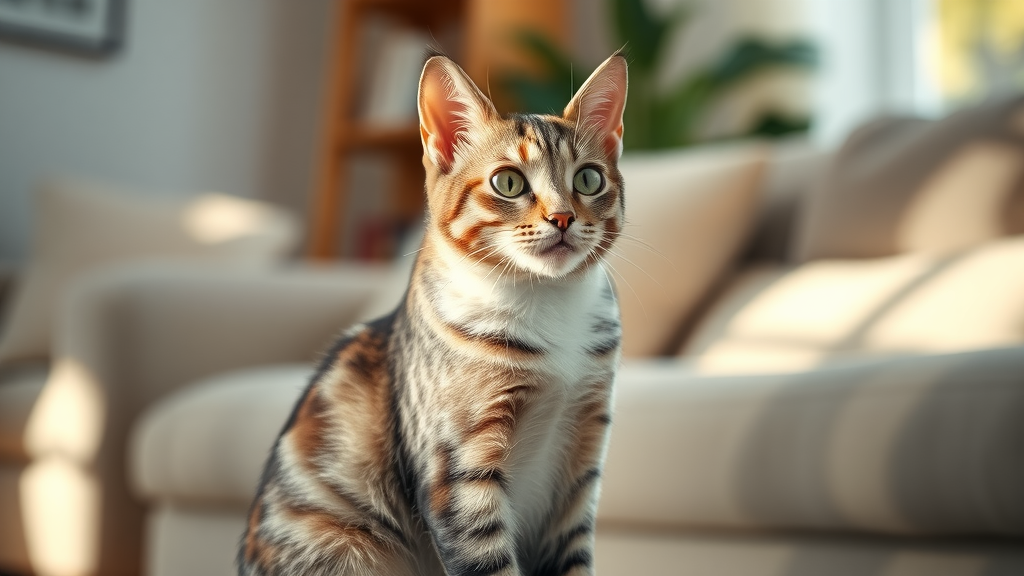
Common Types of Illness in Cats: From Upper Respiratory Disorders to Chronic Diseases
Some common illnesses to watch for in cats include upper respiratory infections, urinary tract infections or blockages, gastrointestinal issues like vomiting or diarrhea, and chronic illnesses such as kidney disease or diabetes in cats . Respiratory infections may present as sneezing, coughing, or nasal discharge, while digestive issues often involve changes in appetite or litter box habits. Chronic issues might only become noticeable through slow weight loss, increased thirst, or poor coat quality.
Certain health issues are also more common in specific categories—kittens are vulnerable to intestinal parasites, while older cats often develop kidney disease or arthritis. Some breeds are genetically predisposed to particular diseases, so knowing your cat's history helps pinpoint which signs of illness to be most alert for.
How Illness in Cats Impacts Energy Level, Appetite, and Daily Behaviors
The earliest symptoms that a cat is sick often show up as changes in their daily routine. You may notice your cat has a lower energy level , sleeps more than usual, or becomes less sociable. Other cats may skip meals, drink more water (increased thirst), or start making more frequent trips to the litter box. Behavioral shifts can also include uncharacteristic hiding or aggression.
It's crucial to remember that even a small change in your cat's appetite, grooming, or interaction could indicate a growing health problem. By comparing their current behaviors to their usual routine, you'll be more likely to spot what are signs of illness in cats before they escalate.
| Sign | Healthy Cat | Sick Cat |
|---|---|---|
| Energy Level | High | Lethargic/Low |
| Appetite | Normal | Decreased/Increased |
| Litter Box Behavior | Consistent | Changed |
| Thirst | Normal | Increased/Reduced |
| Coat Condition | Well-groomed | Matted/Dry |
Core Symptoms: What Are Signs of Illness in Cats? to Watch Closely
- Sudden changes in energy level
- Loss of appetite or increased thirst
- Unusual hiding or aggression
- Vomiting, diarrhea, or changes in litter box habits
- Coughing, sneezing, or respiratory infection symptoms
- Noticeable weight loss or gain
- Changes in grooming behavior or coat quality
- Discharge from eyes, nose, or mouth
Spotting the core symptoms of illness in your cat is essential for their on-going wellbeing. Most signs of illness in cats revolve around changes in energy level, eating and drinking habits, and shifts in how they use the litter box. A sick cat may also show more subtle body language cues, like sudden hiding or increased aggression. Vomiting, diarrhea, or respiratory symptoms can also develop, often rapidly.
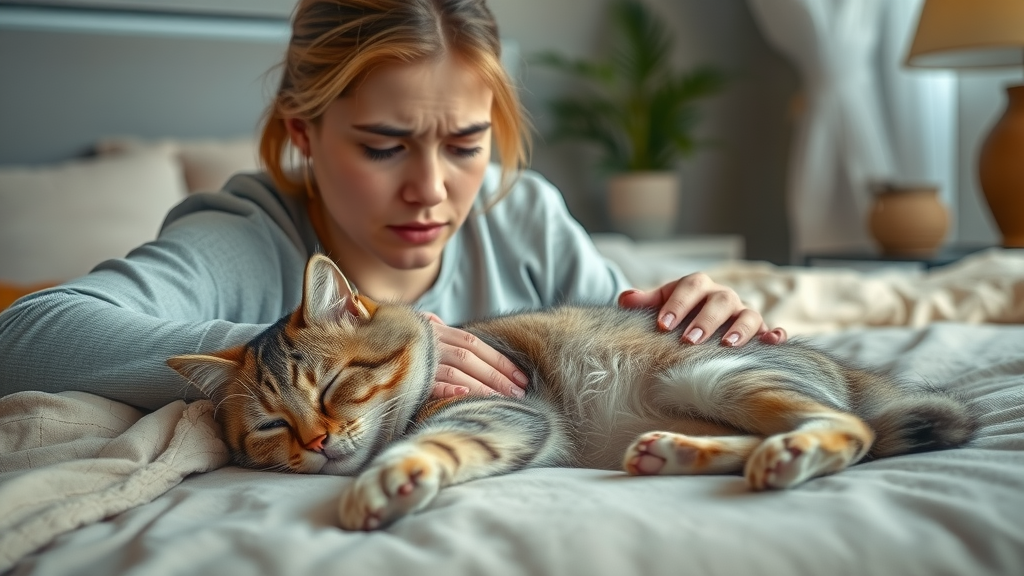
If your cat suddenly develops any of these symptoms, early detection is key. Especially with older cats, chronic health issues can manifest slowly, so taking note of day-to-day changes helps catch illness before it becomes urgent. If you notice multiple symptoms or if any issue seems persistent, call your vet as soon as possible.
Behavioral Cues: How a Cat Is Sick May Reveal Itself Through Subtle Actions
Signs That Your Cat’s Energy Level Signals a Health Issue
One of the earliest signs that your cat could be unwell is a noticeable drop in their usual activity. While all cats enjoy a good nap, if your feline friend becomes lethargic—sleeping more than normal, refusing play, or showing less interest in their environment—these can all point to a health issue . A decline in energy level might signal anything from a mild infection to a more serious health problem.
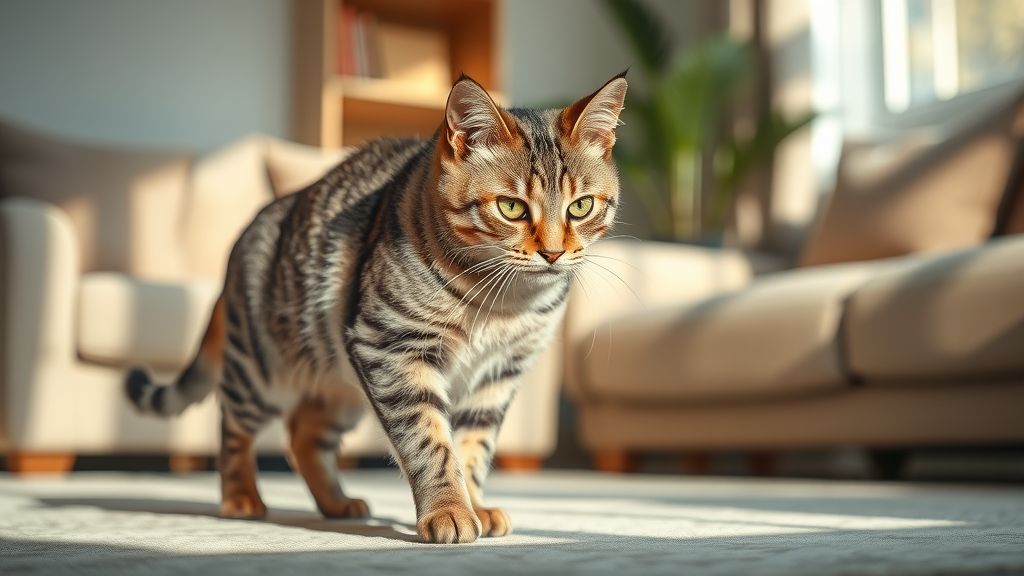
On the flip side, some sick cats may act restless, showing increased agitation or pacing. Both ends of the activity spectrum—either too little or too much—differ from their normal behavior and should raise a red flag for owners. Compare your cat’s current energy level to their baseline to catch illness early.
Withdrawal, Excessive Hiding, or Sudden Aggression: Recognizing Emotional Signs of Illness in Cats
Cats are famous for their independence, but sudden withdrawal or hiding can be a major indicator that something is wrong. Emotional or behavioral changes are sometimes the only clue that a cat is sick . Watch for signs such as excessive hiding, avoiding favorite spots, or showing aggression they never did before.
"Cats are experts at masking discomfort—owners who know the subtle signs of illness in cats can make a life-saving difference." – Veterinarian Jane Smith, DVM
Don’t ignore these behavioral shifts. Withdrawal and aggression may happen for many reasons: pain, nausea, or neurological conditions. If this behavior lasts more than a day or two, or is accompanied by physical symptoms like vomiting or weight loss, seek veterinary care promptly.
Physical Symptoms: Visible Evidence Answering What Are Signs of Illness in Cats?
Respiratory Infection and Upper Respiratory Warning Signs
Upper respiratory infections are very common in cats, especially in those exposed to crowded environments or who have compromised immune systems. Key symptoms of a respiratory infection include sneezing, nasal or eye discharge, coughing, and noisy breathing. An infected cat with respiratory issues may also keep their mouth open to breathe, or have reduced appetite due to congestion.
If you notice any persistent coughing or wheezing, or if a young or old cat has trouble breathing, consider this a veterinary emergency. Some respiratory infections can quickly turn serious, especially if left untreated , so prompt intervention is a must.
Vomiting, Diarrhea, and Gastrointestinal Health Issues in Cats
Occasional vomiting may be normal in cats, but repeated vomiting, diarrhea, or constipation indicates a potential health problem . Gastrointestinal symptoms may be caused by anything from ingesting toxic substances to food sensitivities, intestinal parasites, or chronic diseases like kidney disease .
If gastrointestinal symptoms last for more than 24 hours, are severe, or are accompanied by other signs of illness (like lethargy or decreased appetite), it’s critical to seek veterinary care. Proper diagnosis and treatment are essential, especially since dehydration can become life-threatening very quickly.
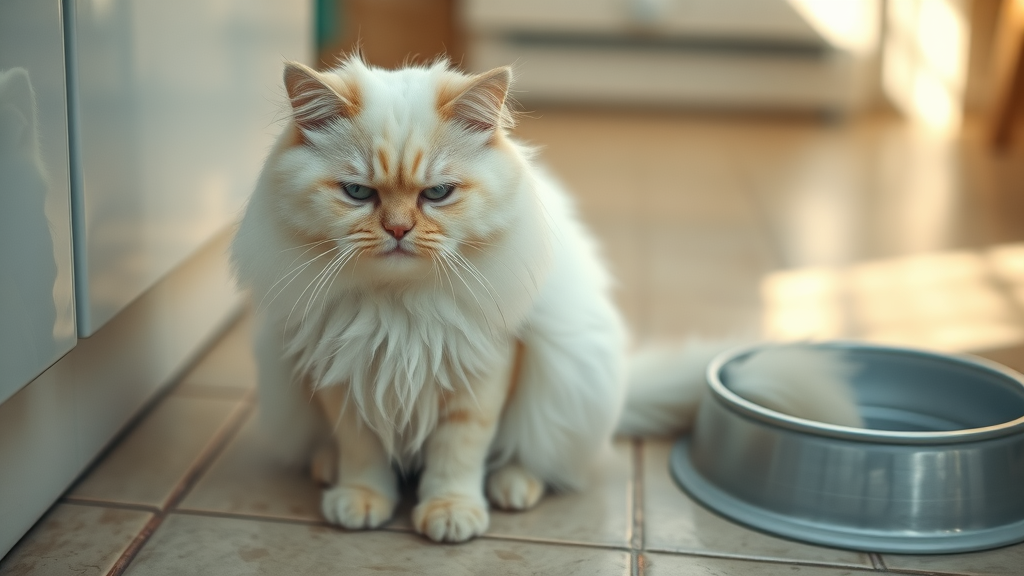
Litter Box Red Flags: Urinary or Fecal Health Issue Indicators
Changes in litter box habits are another big clue that your cat is sick. Signs such as straining to urinate, visiting the box more frequently, urinating outside of the box, or blood in the stool or urine can all indicate serious health issues —including urinary tract blockages or infections which are emergencies, especially in male cats.
Monitor how often your cat uses the litter box and note any sudden changes. A cat that suddenly starts eliminating in unusual places or shows distress in the box may be signaling pain or discomfort. Immediate attention to any litter box irregularities can prevent complications and keeps your feline friend healthier.
Coat and Skin Condition: Physical Clues to Illness in Cats
The condition of your cat’s coat and skin can say a lot about their overall health. Look for signs such as a dull, scruffy, or matted coat, bald patches, excessive scratching, or visible wounds. A healthy cat is typically well-groomed and has a shiny, soft coat—with over- or under-grooming serving as signals your cat is sick.
Cats with chronic health problems often develop dry skin, dandruff, or lose hair. These changes might indicate allergies, infections, or more serious health conditions like diabetes or kidney disease. Routine observation of your cat’s coat helps ensure you catch subtle signs of illness early.
Advanced Indicators: Subtle and Chronic Illness in Cats

Weight Fluctuations and Muscle Mass as Health Issue Symptoms
One overlooked sign of illness is unintentional, unexplained weight loss or gain. Chronic diseases such as kidney disease , diabetes mellitus, or even cancer often cause significant changes in weight and a loss of muscle mass. This may happen gradually, especially in an older cat or those with health problems that develop over time.
Sudden weight loss can be a sign that your cat isn’t absorbing nutrients properly, or may have a hidden illness. Regularly weigh your cat and monitor their body shape—early detection of weight decline can signal a need for prompt veterinary assessment before the disease progresses.
Increased Thirst and Changes in Appetite: Alert Signs
If your cat begins drinking more water than usual (increased thirst) or suddenly loses interest in food, it might be a symptom of health issues like diabetes in cats or chronic kidney disease. Some sick cats may even develop an increased appetite due to certain hormonal imbalances or diseases.
Always note changes in drinking and eating behavior, especially if your cat is also urinating more, losing weight, or acting out of character. Consistent tracking of feeding and hydration routines helps alert owners to what are signs of illness in cats that need medical investigation.
Unusual Vocalizations and Mobility Changes: What Are Signs of Illness in Cats? That Owners Miss
Vocal changes—such as sudden meowing, wailing, or silence—might relate to pain, confusion (especially in older cats), or discomfort. Additional clues include limping, difficulty jumping, or change in gait. Health issues affecting mobility or balance can often be subtle, but are significant indicators that a cat is suffering.
Watch for ongoing shifts in your cat’s voice, movement, or posture, as these may precede more obvious signs of disease. Anything that affects your cat’s ability to move comfortably, climb, or engage in usual behavior should be addressed with your veterinarian.
Case Studies: Real Examples Showcasing What Are Signs of Illness in Cats?
- Case 1: Lethargy and Increased Thirst in a Senior Cat
- Case 2: Young Cat with Sudden Hiding and Appetite Loss
- Case 3: Middle-aged Cat with Respiratory Infection and Coughing
Looking at real-life examples helps illustrate just how varied signs of illness in cats can be. In Case 1, a senior cat slowly loses energy, drinks more, and begins to avoid stairs—signs often linked to kidney disease or diabetes. In Case 2, a young cat hides under the bed, refuses treats, and skips playtime; after a check-up, the cause is an intestinal parasite. Case 3 involves a middle-aged cat developing persistent coughing and a runny nose, classic indicators of an upper respiratory infection requiring medication and supportive care.
In each scenario, attentive monitoring and early veterinary intervention lead to successful outcomes. By knowing what to watch for, you can help your cat recover quickly and prevent long-term complications.
When to Seek Help: Deciding If a Cat Is Sick Enough for a Vet Visit
- Persistent vomiting or diarrhea
- Difficulty breathing or severe respiratory infection
- Refusal to eat/drink for over 24 hours
- Sudden collapse or unresponsiveness
If you notice any of the above symptoms, act quickly and call your vet or an emergency clinic. Persistent or severe symptoms, especially in kittens, seniors, or cats with chronic conditions, can escalate quickly and may be life-threatening. Never wait if your cat is sick and showing these red-flag signs; immediate, professional care gives your feline friend the best chance at a full recovery.

Trust your instincts as a pet parent—if something feels off, or if your cat’s symptoms worsen, it’s always better to seek veterinary care sooner rather than later. Prompt action can make the difference between a manageable health issue and a medical emergency.
Home Monitoring: Tracking What Are Signs of Illness in Cats? Before the Vet
Daily Checks: Observing Energy Level, Appetite, and Litter Box Use
Being vigilant about your cat’s routine is your first line of defense against hidden illness. Check their energy level each day—are they alert, playful, or unusually tired? Make note of food and water intake, and keep an eye on consistent, regular use of the litter box. Even the smallest deviation from their normal pattern could indicate a budding health problem.
Record-Keeping: Documenting Health Issues and Their Progression
Maintain a simple log of your pet’s habits for easy reference. List mealtimes, quantities, litter box changes, and any symptoms—like vomiting or coughing—as they arise. Accurate, detailed notes help your veterinarian make quicker diagnoses and track progress if your cat is undergoing treatment for a health issue .
Digital apps or old-fashioned notebooks both work well. By reviewing your records, you’ll spot subtle shifts over time, supporting early detection and giving your feline the best chance for prompt care.
Preventative Care: Reducing Risks of Illness in Cats
Routine Veterinary Exams & Vaccinations for Health Issues Prevention
Schedule regular check-ups at the vet, even if your cat appears healthy. Annual or biannual exams help catch illness in cats early—before major symptoms arise. Core vaccinations and parasite control are also key to preventing common illnesses like upper respiratory infections or intestinal parasites.
Early diagnosis during routine care is easier to treat, less costly, and a lot less stressful for both cats and owners. Always follow your veterinarian’s recommendations for preventive health schemes, including dental cleanings and regular lab tests.
Healthy Diet, Hydration, and Environmental Enrichment
Support your cat’s immune system and wellbeing with high-quality food, fresh water, and a stimulating environment. A balanced diet helps avoid obesity and related health problems, while proper hydration supports kidney and urinary health. Give your cat scratching posts, toys, and opportunities for mental stimulation to reduce stress—another major risk factor for sick cat scenarios.
Preventing illness in cats is an ongoing process—consistently monitor their diet, water intake, and daily activity, and you’ll set your feline up for a long, healthy life.
Special Considerations: Age, Breed, and Chronic Health Issues
- Kittens and senior cats: Higher risks of rapid illness
- Purebred vs domestic cats: Genetic predispositions
- Chronic health issue management
- How aging cats may hide signs your cat is sick
Age and genetics play a big role in how signs of illness show up in cats. Kittens and seniors are especially vulnerable—illness can advance rapidly, and subtle symptoms may become life-threatening in hours, not days. Purebred cats may have unique predispositions to diseases, such as kidney issues or heart conditions.
If your cat has a known chronic disease, regular vet visits and close observation become even more important. Senior cats often become experts at masking their symptoms—stay alert for even the smallest changes in usual behavior .
People Also Ask: FAQs on What Are Signs of Illness in Cats?
How can you tell if your cat is unwell?
- Observe changes in behavior, appearance, and routine
- Look for sudden shifts in appetite, litter box habits, or energy levels
You can tell if your cat is unwell by spotting changes in their eating, drinking, grooming, and social behaviors. Notice if they hide more, avoid the litter box, or refuse favorite foods—these are clear signs that your cat may be sick and in need of care.
How do cats act if they're sick?
- Prolonged hiding, reduced playfulness, loss of curiosity
- Increased vocalization or irritability
Sick cats often become withdrawn, hiding for long periods or losing interest in their environment. Some may become more vocal or irritable, showing increased anxiety or discomfort with handling.
How do cats act when they sense illness?
- May become clingy to comfort the sick owner
- Detect changes in owner with heightened sensitivity
Cats can be unusually sensitive to illness in their human family, often becoming extra attentive, clingy, or affectionate when someone at home is unwell. This heightened sensitivity is another reminder of their close bond with owners.
What are the symptoms of a cat with a disease?
- Weight loss, persistent vomiting or diarrhea, respiratory issues
- Poor coat, changes in thirst or urination
A cat with a disease may display ongoing vomiting, breathing problems, sudden weight change, and poor coat condition. Increased thirst, urination, or changes in energy level are additional symptoms that suggest an underlying disease requiring veterinary evaluation.
Essential Checklist: What Are Signs of Illness in Cats? Every Owner Should Know
- Unexplained weight changes
- Vomiting or diarrhea
- Over/under grooming
- Sudden changes in energy level
- Labored breathing or coughing
- Increased thirst
- Unusual litter box habits
- Behavior changes
Keep this checklist handy and use it as a daily reminder of what to look for in your cat’s health. Awareness and prompt action help keep your feline friend happy and healthy for years to come.
Review: What You'll Gain From Early Recognition of What Are Signs of Illness in Cats?
- Empowerment to identify early warning signs your cat is sick
- Ability to act promptly and seek veterinary care
- Enhanced lifelong quality for your feline companion
Understanding what are signs of illness in cats lets you catch health problems sooner, act quickly, and safeguard your feline friend’s wellbeing for the long run. Take a proactive approach and enjoy more years with your unique companion.
Final Thoughts: Staying Vigilant with What Are Signs of Illness in Cats? for Feline Wellbeing
"A vigilant owner is a cat’s greatest healthcare ally. Early intervention is the key to a long, healthy, happy life."
- Monitor your cat’s behavior and physical condition regularly
- Take preventive action by scheduling regular veterinary visits
- Trust your instincts—acting early with signs of illness in cats makes a difference
Get Expert Pet Care: Subscribe for Monthly Tips and Discover More on What Are Signs of Illness in Cats?
- We can’t teach your dog to sit — but we can deliver great pet advice every month. 🐕 Subscribe to the newsletter and fetch some fun!
Recognizing the early signs of illness in cats is crucial for ensuring their health and well-being. To deepen your understanding, consider exploring the following resources:
-
Recognizing the Signs of Illness in Cats by VCA Animal Hospitals provides comprehensive insights into subtle behavioral and physical changes that may indicate health issues in felines.
-
10 Subtle Signs Your Cat Might Be Sick from the Animal Medical Center of Bel Air outlines lesser-known symptoms that could signal underlying health problems in cats.
By familiarizing yourself with these signs, you can take proactive steps to maintain your cat’s health and seek timely veterinary care when necessary.
 Add Row
Add Row  Add
Add 


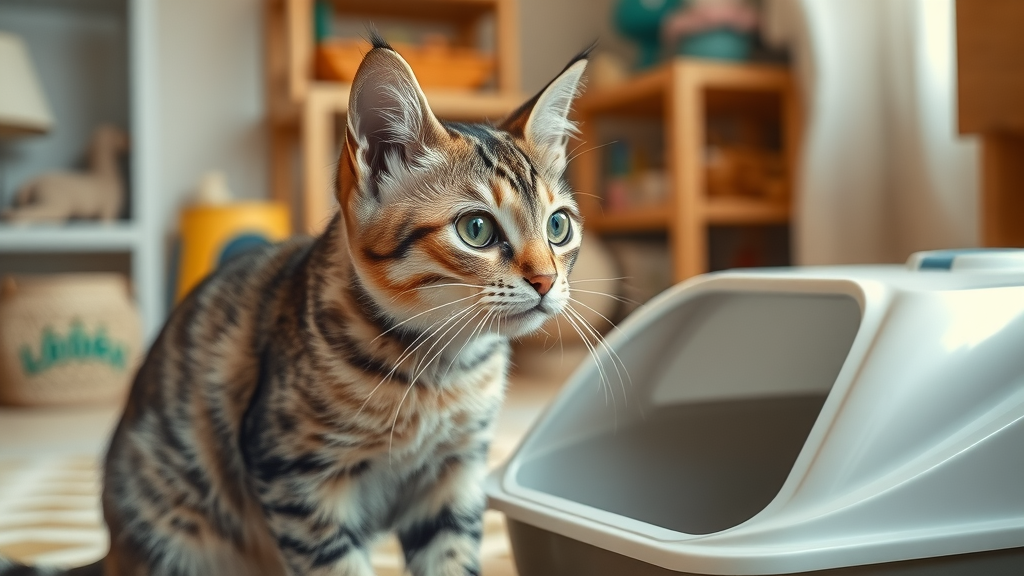

Write A Comment